| Srl | Item |
| 1 |
ID:
152032
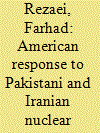

|
|
|
|
|
| Summary/Abstract |
This article explores the paradox in the reaction of the United States to the two different proliferation cases: Pakistan's proliferation and Iran's weaponization effort. The article tries to find answer to the following key question; why the United States, as one of the guardians of the Non-proliferation Treaty (NPT) which would prefer to see a region that is entirely free of weapons of mass destruction, ultimately has accepted Pakistan's proliferation, while imposed considerable amount of pressure to stop Iran from acquiring nuclear weapons.
|
|
|
|
|
|
|
|
|
|
|
|
|
|
|
|
| 2 |
ID:
154314
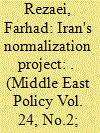

|
|
|
| 3 |
ID:
169590
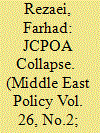

|
|
|
|
|
| Summary/Abstract |
The prospect of a nuclear‐armed Iran unsettled neighboring countries and threatened a nuclear arms race in the Middle East. To thwart Iran's ambition, the international community imposed an increasingly crippling series of economic sanctions. The regime responded by entering negotiations in 2013 that culminated in a deal known as the Joint Comprehensive Plan of Action (JCPOA), signed by Iran and the P5+1 on July 14, 2015. Iran committed itself to a serious rollback of its nuclear project in exchange for sanctions relief. In December 2015, the International Atomic Energy Agency (IAEA) certified Iran to be in compliance with the agreement, paving the way for sanctions relief. The IAEA promised stringent oversight of Iran's remaining civil program for the 15‐year duration of the agreement. All sides expressed optimism that the deal would prevent proliferation in the Middle East.1
|
|
|
|
|
|
|
|
|
|
|
|
|
|
|
|
| 4 |
ID:
156481
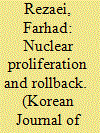

|
|
|
|
|
| Summary/Abstract |
This study seeks to provide answers to the following questions; what were the real
motivations behind Iran’s nuclear program?; to what degree did key players of
Iran’s nuclear program at a given time period fit the rational proliferator profile?;
and eventually, how did key elites agree on a unified set of parameters of rollback
in the nuclear program in exchange for the lifting of sanctions? The study has three
objectives. The first objective is to ascertain whether Iran fits the profile of a rational
proliferator. The second objective is to determine whether its response to sanctions
followed the rational modality expectations embedded in proliferation theories.
The third objective is to identify the background of the initial decision to pursue the
nuclear program with a special emphasis on key motivations and factors that helped
to drive it from a very modest beginning to a virtual breakout position.
|
|
|
|
|
|
|
|
|
|
|
|
|
|
|
|
| 5 |
ID:
159223


|
|
|
|
|
| Summary/Abstract |
The objective of this study is to understand the shift in the nuclear policy of the Islamic Republic Revolutionary Guards (IRGC). As a military organization considered to be the steward of the nuclear programme, the Revolutionary Guards turned into spoilers on the few occasions when the pragmatists in Iran tried to negotiate a deal with the international community. In a surprising shift, the Guards’ nuclear policy changed and supported nuclear negotiations and the nuclear agreement. It is assumed that the IRGC is more interested in its economic ventures than in promoting the nuclear project. To test the hypothesis, the present study is designed to provide a rigorous empirical examination of the economic impact of the sanctions on the Revolutionary Guards.
|
|
|
|
|
|
|
|
|
|
|
|
|
|
|
|
| 6 |
ID:
156850
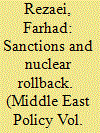

|
|
|
| 7 |
ID:
148614
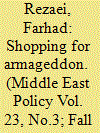

|
|
|